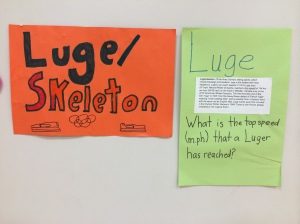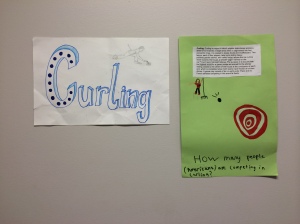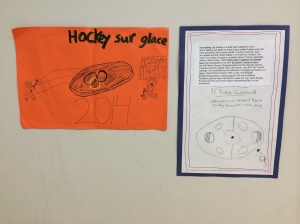E2 – Exemplify collaboration within the school.
May 7, 2014 § Leave a comment
E2 – Exemplify collaboration within the school. Teacher candidates participate collaboratively and professionally in school activities and using appropriate and respectful verbal and written communication. Collaborating with colleagues is an important part of being apart of a department within a school. Communicating with others benefits students because work with colleagues allows for growth and new ideas in the curriculum. Collaboration is essential in any school. This principle of Hope asks interns to participate collaboratively and professionally in school activities and using appropriate and respectful verbal and written communication. During the winter Olympics, the physical education teachers and the French teacher decided to create an Olympic event that incorporated student research of French names and history of the sports. The process required a lot of collaboration and communication in the weeks leading up the event, making sure the curriculum in French was aligned well with physical education and fit for life curriculum. This required us to meet several time during the week, which at times was hard to match up our schedules.
Allowing yourself to be open to collaboration with colleagues is an important skill in teaching. Sometimes we don’t see something that could be changed or improved because only our eyes have seem them. When we allow ourselves to be vulnerable to others opinions and ideas, we often create a better product that we could produce ourselves. We do ours students a service by creating lessons and curriculum that are thorough, quality, and unbiased and we do that by collaborating with others. It was a really good learning experience for me having the chance to collaborate without someone outside of my subject area. The event was also a great success. Below are posters students created during French class for the different event stations using there french name. Each poster talks about the history of the sport and asks students some questions. During the event, while students rotated from station to station doing the activity they were also responsible for answering the questions.
What is meant by “knowledge is socially constructed?”
February 9, 2013 § Leave a comment
I have always believed that school is a social environment, and that using the social environment to a teacher’s advantage is a wise move. John Dewey (1897) stated in his creed, “I believe that the only true education comes through the stimulation of the child’s powers by the demands of the social situations in which he finds himself” (p. 1). Humans are social beings so forth this translates to many aspects of our lives, especially at school. Children develop relationships with one another through interactions, such as conversations, group assignments, group discussions and group activities. Swiss psychologist Jean Piaget and Russian psychologist Lev Vygotsky believed children acquired language through social interaction, this is something I emphasis a lot in my classroom now, as a Pre-kindergarten teacher. This is very much supported not just with group activities and discussion but also through imaginary play. Young children are able to develop communication skills and problem solving skills. In Physical Education, social connections and interactions are really important for learning individual skills and concepts, and most important learning team sports.
Marzano, Pickering, and Pollock (2001) focus on grouping students. Allowing students to study in a group gives them a chance to learn from others and hear perspectives and ideas that they would have never thought of before. Marzano, et. al. (2001), suggest that these groups not be based on ability and are not too large, and that grouping be used systematically (p. 87-88). In other words, it is important to diversify student groups so that children are learning from different perspectives. Mixing children with various ability levels will help challenge them to exceed their own expectations. I learned most of my soccer skills working with peers that I considered above my level so it challenged me to work harder. If groups get too large, children might have a difficult time focusing, and it could be difficult for every child to voice their opinion. Therefore, a smaller group would be more beneficial to all. If groups are overused, students may take advantage of the situation, using group time as a gossip time, and therefore daily variation when creating groups is very important. John Dewey was correct in emphasizing the importance of socialization in his creed. As social beings, we learn from our social interactions, so for that reason cooperative learning is very powerful in any subject area.
References:
Dewey, J. (1897). My Pedagogic Creed. The School Journal.
Marzano, R., et. al. (2008). Classroom Instruction that Works. ASCD.


